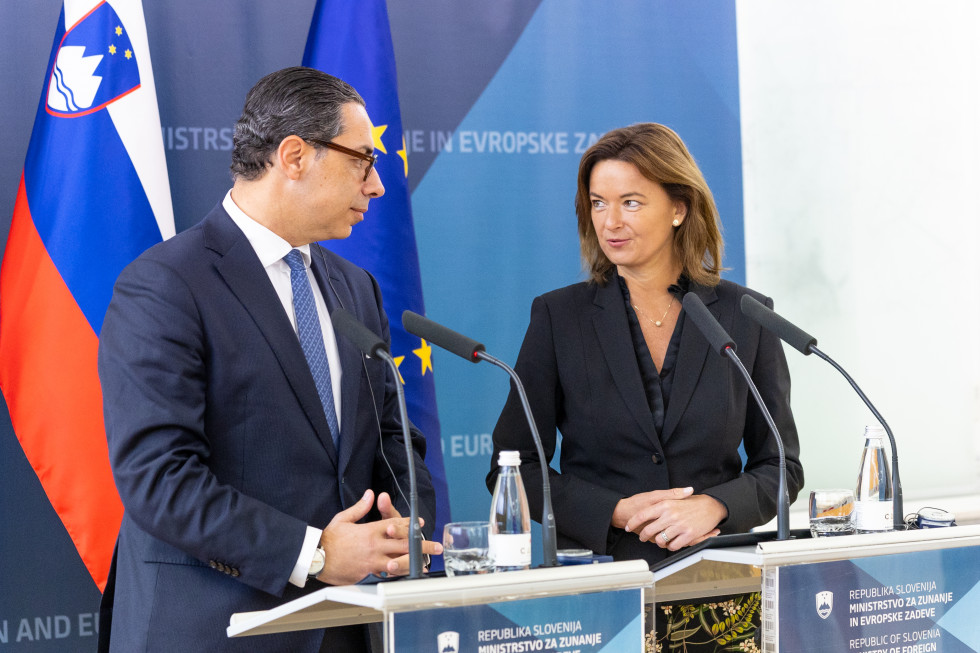Minister Fajon: "We support the UN-led negotiation process to resolve the Cyprus issue"

Minister Tanja Fajon and Foreign Minister of Cyprus, Dr Constantinos Kombos | Author Ministrstvo za zunanje in evropske zadeve
As a non-permanent member of the United Nations Security Council, Slovenia will pay special attention to the Cyprus issue. In this regard, Minister Fajon stressed: “I would like to see the unanimous adoption of a resolution to extend for one year the mandate of the UN peacekeeping force in Cyprus, which has kept the island at peace for 60 years. Today, I can announce that Slovenia will contribute up to 15 troops to this mission. The Ministry of Defence is already working on the return of the Slovenian Armed Forces to Cyprus later this year, to a mission, in which they have already participated in the past. Slovenia also supports the UN-led negotiations on the Cyprus problem and the good offices mandate of the UN Secretary-General, who last week appointed Ms María Angela Holguín Cuéllar, the extensively experienced former Minister of Foreign Affairs of Colombia, as his Personal Envoy on Cyprus." On the Cyprus issue, the Minister added that Slovenia supports progress towards a bizonal, bicommunal federation in line with UN Security Council resolutions.
Ministers Fajon and Kombos called for dialogue and closer cooperation between the two countries, especially in the context of Slovenia's membership of the UN Security Council and the second Presidency of the Council of the EU for Cyprus in the first half of 2026. They agreed to continue their bilateral dialogue at the European and international levels and underlined their commitment to respect the international law and human rights.
In view of the current geopolitical situation, a large part of their talks focused on the Middle East. They agreed on the need to find a political, rather than a military, solution to the Israeli-Palestinian conflict. "There is an urgent need to achieve an immediate ceasefire and to create the conditions for the earliest possible start of talks on a two-state solution for peaceful coexistence between Israelis and Palestinians. As the main task is to protect civilians, Slovenia welcomes the Cypriot initiative to establish a maritime humanitarian corridor for the delivery of humanitarian aid from Cyprus to Gaza. Every additional civilian casualty is one too many and is proving that we have clearly failed the test of humanity," said Ms Fajon.
As regards the Houthi attacks on merchant ships in the Red Sea, which also affect the Port of Koper, Minister Fajon explained that the Ministry of Foreign and European Affairs was closely monitoring developments and announced consultations within the EU, NATO and the UN Security Council: "The targeted US and UK airstrikes on Houthi positions in Yemen are bringing a new dynamic to the region that could further complicate the situation.”
The two ministers expressed their interest in strengthening economic relations between the two countries, particularly in the fields of transport and logistics: "I am pleased that talks are underway with Cyprus Airlines to establish a connection between Ljubljana and Larnaca, which would increase business opportunities for both sides. I believe this would also help enhance cooperation between the two countries," said Minister Fajon.
Other topics discussed included further cooperation in the Mediterranean region, in particular in the Union for the Mediterranean, which is an important framework for promoting dialogue and addressing regional challenges, and in the informal group of nine Mediterranean countries MED-9. Both sides support the adoption of reforms to strengthen the functioning of the Union for the Mediterranean and participate in its projects and initiatives. Minister Fajon underlined the importance of continuing to support the Euro-Mediterranean University (EMUNI) in terms of providing funding and improving study programmes.
Discussing the European perspective of the Western Balkan countries, Minister Fajon reiterated that efforts must be made to ensure that both future EU Member States and the EU are ready for enlargement by 2030, in line with the so-called “Bled Commitment”.
